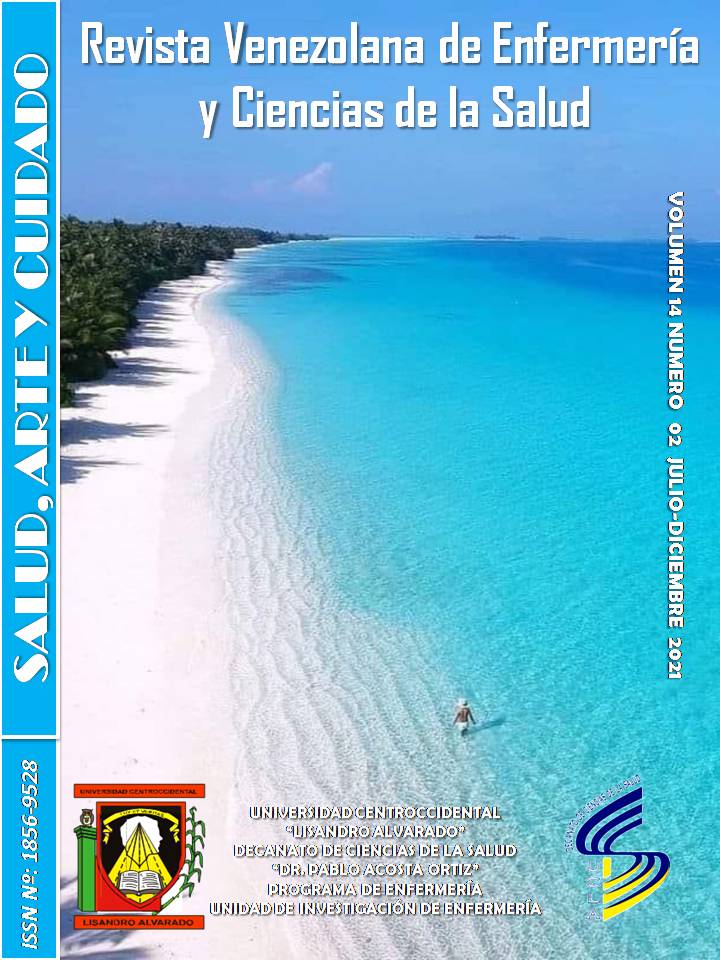Relevance of the lines of research. a vision in the complexity of university institutions
DOI:
https://doi.org/10.5281/zenodo.6969347Keywords:
research lines, university institutions, complexityAbstract
This writing arises from the need for the researcher to break into the topic of the relevance of the lines of research in the current context, where the authorized academic lexicons, the existing legislation and the directives of the higher education centers at the Central Western University Lisandro Alvarado (UCLA) reiterate the importance for research of both the quality of education and quality education, in addition, the search for answers in a context as complex as that of university organizations. It is the challenge of this article, to analyze everything that surrounds the lines of research from the complexity of university organizations, specifically the Dean of Health Sciences of UCLA and what it might be. significant or at least bring the reader closer to an understanding of the concept of lines of research from the systemic and organizational transformation of university institutions, where the university organization turns out to be an interesting and very important reference today. The essence of any process that involves man from any condition, place and space is a generator of changes and it is from there that the university organization as a becoming involves the main phenomena that take place within it, making them processual in nature, and extremely dynamic; its elements are decisions and decisions are events tied to time, in such a way that at the very moment they arise they begin to fade, to make way for new decisions that, connecting with previous decisions, produce the change that is always present and whose tangibility will only be visible when the new parameters products of this change are established, considering the lines of research are to teaching and social projection, what the research tasks are to the university.
Downloads
References
Niño, C. Construcción del Conocimiento. Interciencia. Venezuela. 2016.
Villegas, M. La construcción del conocimiento y la subjetividad en los escenarios del aula de clase. Revista Pedagogía, 2001. XXII (63), 133-144.
Elizondo, L. y Ayala, F. El equilibrio entre la enseñanza y la investigación en países latinoamericanos. Revista Iberoamericana de Educación, 2007 (44) 4.
Katan, L. Formación de Investigadores. Ponencia presentada en reunión de Núcleos de CDCHT y de Postgrados. Margarita 21, 22 y 23 de Junio de 2000
Ugas, G. La complejidad un modo de pensar. Taller Permanente de estudios epistemológicos en ciencias sociales. San Cristóbal. Táchira Venezuela 2008
Marcano, D. y Phélan M. Evolución y desarrollo del programa de promoción del investigador en Venezuela. INTERCIENCIA, 2009. 34 (1), 170-24.
Buitriago, Y., Ceballos, V., Chacín, R., Guzmán, R., Hermoso, V., Pacheco, F. y Torres, A. et. Al. Líneas de investigación. San Juan de los Morros. 2009 UNERG.
Padrón-Guillén, J. El Concepto de Línea de Investigación y sus Implicaciones [En línea]. Disponible: http://entretemas.com.ve/lineai/ConcLinea.htm#3 [Consulta: 2021, mayo 10].
Suing, A. Definición de Línea de Investigación [Documento en línea]. Disponible: https://es.slideshare.net/abelsuing/definicin-de-las-lneas-de-investigacin [Consulta: 2021, mayo 10].
Politécnico Grancolombiano. Líneas de Investigación [Documento en línea]. Disponible: https://apps2.poligran.edu.co/iaplicada/docs/98.pdf
Barrios, Maritza. “Criterios y estrategias para la definición de líneas de investigación y prioridades para su desarrollo”. Caracas (Venezuela). 1999. Universidad Pedagógica Experimental Libertador.
Bayley, Z. La incorporación de la investigación al perfil profesional del pregrado. Paradigma. Caracas. 1995. Universidad Simón Rodríguez
Ruíz, B. Becerra, M. y otros, Líneas de Investigación. Caracas.1994 UPE
Morles, A., Rojas, N., y Vivas, D. Líneas de Investigación. Papel de trabajo. Caracas 1991 UPEL.
Becerra, A. y otros Líneas de Investigación. Caracas. 1994 UPEL.
Chacín, M. y Briceño, M. ¿Cómo generar una línea de investigación? [Documento en línea]. Disponible: https://pubhtml5.com/ehrm/fwar/basic [Consulta: 2021, Julio 18].
Sanjuán, M. La Complejidad en la Ciencia. Grupo de Dinámica No. Lineal y Teorías del Caos. [Línea Virtual] 2007
Morin, E. Inteligencia de la Complejidad. Bases para una reforma Educativa. Buenos Aires. 2000. Ediciones Nueva Visión.
Ramírez, M. Calidad de la enseñanza universitaria. Criterios de Verificación. 1993.
Quijada, M. Gerencia del cambio. Una visión emergente desde la complejidad universitaria. 2019. Artículo científico. Barquisimeto, estado Lara.
Published
How to Cite
Issue
Section

This work is licensed under a Creative Commons Attribution-NonCommercial-ShareAlike 4.0 International License.
Derechos del/de autor/es a partir del año de publicación
Esta obra está bajo la licencia:
Creative Commons Reconocimiento-NoComercial-CompartirIgual 4.0 Internacional (CC BY-NC-SA 4.0)
Las opiniones expresadas por los autores no necesariamente reflejan la postura del editor de la publicación ni de la UCLA. Se autoriza la reproducción total o parcial de los textos aquí publicados, siempre y cuando se cite la fuente completa y la dirección electrónica de esta revista. Los autores(as) tienen el derecho de utilizar sus artículos para cualquier propósito siempre y cuando se realice sin fines de lucro. Los autores(as) pueden publicar en internet o cualquier otro medio la versión final aprobada de su trabajo, luego que esta ha sido publicada en esta revista.







